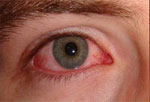There’s Nothing Romantic About Watching the Sun Rise…From Lab
by
 Sleep is rarely considered a reagent, but without it few experiments reach a successful conclusion. In fact, researchers have demonstrated “sleep drunkenness“, where individuals deprived of sleep perform similarly to those who have been drinking. So while PIs may think a lack of sleep is no big deal, when’s the last time they said “Experiments still not working – have you tried drinking a 6-pack of Pabst Blue Ribbon before starting the assay?”
Sleep is rarely considered a reagent, but without it few experiments reach a successful conclusion. In fact, researchers have demonstrated “sleep drunkenness“, where individuals deprived of sleep perform similarly to those who have been drinking. So while PIs may think a lack of sleep is no big deal, when’s the last time they said “Experiments still not working – have you tried drinking a 6-pack of Pabst Blue Ribbon before starting the assay?”
Nevertheless, research is rarely predictable and deadlines often seem to creep up on us despite our best intentions. Whether it’s preparing a talk, writing a grant, or performing an experiment, sleep occasionally takes a back seat.

Quick Test: If your eyes look like this - time to get reacquainted with your bed.
In college all-nighters are commonplace as our bodies seem to anticipate our lack of planning skills. However, as we move through graduate school and a postdoc, our body grows increasingly impatient with our chaotic scheduling and seems to take pleasure in punishing us for days after spending a sleepless night in the lab.
Of course, the irony is that as we age our bodies are less capable of bouncing back after an all-nighter yet our lives continue to pile on responsibilities (job, house, kids, etc.) that increase the chances we’ll need to stay up to get everything completed. So how well have you been able to avoid the graveyard shift in lab?
.
.
.


@chrisadieni
wrote on July 18, 2011 at 10:17 pm
The funny thing is, I don't mind spending all-nighters in the lab; in fact under certain circumstances I actually enjoy it. First, when I'm working and things are going well, I like to keep that momentum going for as long as I can keep it up. Second, if I'm working with something unstable or perishable that won't be around anymore in the morning, sometimes you need to put in the hours to work with it while you've got it. That being said, if you're fatigued to the point of making mistakes, it's not to your advantage after all.
The caveat is: at what time does your PI expect you to be in the lab the following morning? If you've been in the lab until 1 AM and your PI is hunting for you to have a conversation at 8:30 AM, there's a problem. On the other hand, if you're in the lab until 1 AM and you can manage to stroll into the lab at 2 PM the following day, then things begin to balance out. Really, it's all about how much flexibility and control you have over your own schedule.
alan@benchfly
wrote on July 19, 2011 at 2:59 pm
It's true that when things are going well, it's a good idea to strike while the iron's hot. Of course, as you say, if you're so tired that you're making mistakes, there goes your momentum.
It seems the two times I work the hardest are when things are either going very well (maintain momentum) or really poorly (figure out what's wrong asap). Of course, I realize that almost every lab situation falls into one of those two categories – so looks like it's time to find a new strategy…
The PI component is really important and should be a major factor in setting your schedule. Some PIs like people to physically be in lab at certain times, and others don't care as long as the work gets done. If your boss likes to see people there between 9am-5pm, then do it – it's way easier than battling them everyday… for years. I've seen it happen and it never ends well.
amontenegro
wrote on July 19, 2011 at 2:55 pm
I'm in a circadian lab… I guess that's all I can say.
alan@benchfly
wrote on July 19, 2011 at 3:03 pm
Hahaha- classic.
Carlton Hoyt
wrote on July 21, 2011 at 11:48 am
Used to run an experiment that used highly perishable samples that didn't store well. Collecting, preparing, and running all the samples would take anywhere from 12-20 hours, so I didn't have much of an option.